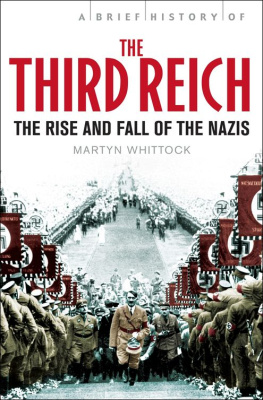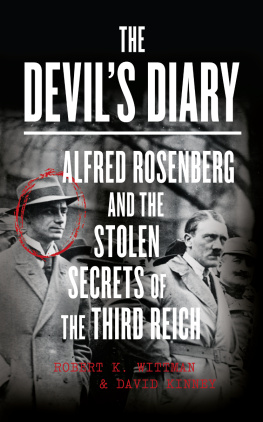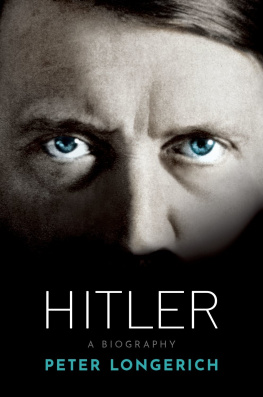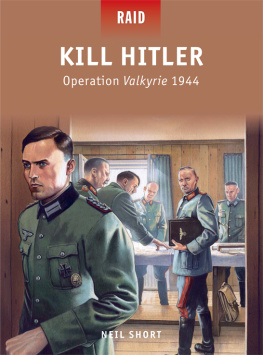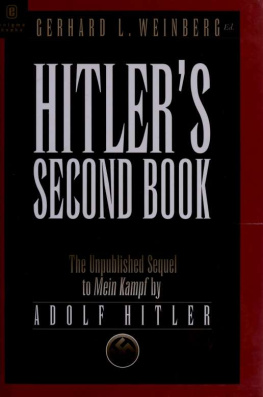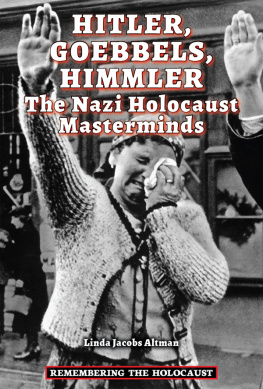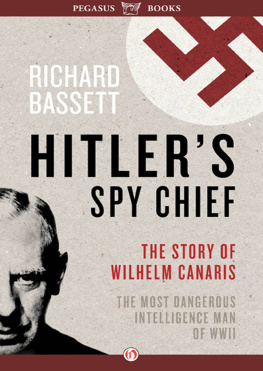Enigma Books
Also published by Enigma Books
Hitlers Table Talk: 19411944
In Stalins Secret Service
Hitler and Mussolini: The Secret Meetings
The Jews in Fascist Italy: A History
The Man Behind the Rosenbergs
Roosevelt and Hopkins: An Intimate History
Diary 19371943 (Galeazzo Ciano)
Secret Affairs: FDR, Cordell Hull, and Sumner Welles
Hitler and His Generals: Military Conferences 19421945
Stalin and the Jews: The Red Book
The Secret Front: Nazi Political Espionage
Fighting the Nazis: French Intelligence and Counterintelligence
A Death in Washington: Walter G. Krivitsky and the Stalin Terror
The Battle of the Casbah: Terrorism and Counterterrorism in Algeria 19551957
Hitlers Second Book: The Unpublished Sequel to Mein Kampf
At Napoleons Side in Russia: The Classic Eyewitness Account
The Atlantic Wall: Hitlers Defenses for D-Day
Double Lives: Stalin, Willi Mnzenberg and the Seduction of the Intellectuals
France and the Nazi Threat: The Collapse of French Diplomacy 19321939
Mussolini: The Secrets of His Death
Mortal Crimes: Soviet Penetration of the Manhattan Project
Top Nazi: Karl WolffThe Man Between Hitler and Himmler
Empire on the Adriatic: Mussolinis Conquest of Yugoslavia
The Origins of the War of 1914 (3-volume set)
Hitlers Foreign Policy: 19331939The Road to World War II
The Origins of Fascist Ideology 19181925
Max Corvo: OSS Italy 19421945
Hitlers Contract: The Secret History of the Italian Edition of Mein Kampf
Secret Intelligence and the Holocaust
Israel at High Noon
Balkan Inferno: Betrayal, War, and Intervention, 19902005
Calculated Risk: World War II Memoirs of General Mark Clark
The Murder of Maxim Gorky
The Kravchenko Case: One Mans War On Stalin
Operation Neptune
Paris Weekend
Shattered Sky
Hitlers Gift to France
The Mafia and the Allies
The Nazi Party, 1919-1945: A Complete History
Encyclopedia of Cold War Espionage, Spies, and Secret Operations
The Cicero Spy Affair
A Crate of Vodka
NOC
The First Iraq War: Britains Mesopotamian Campaign, 1914-1918
Becoming Winston Churchill
Hitlers Intelligence Chief: Walter Schellenberg
Salazar: A Political Biography
The Italian Brothers
Nazi Palestine
Code Name: Kalistrat
Pax Romana
Lenin and His Comrades
Working with Napoleon
The Decision to Drop the Atomic Bomb
Target Hitler
Truman, MacArthur and the Korean War
The Eichmann Trial Diary
American Police: A History, Vol. 1
American Police: A History, Vol. 2
Cold Angel
Alphabet of Masks
Stalins Man in Canada
Hunting Down the Jews
Mussolini Warlord
Election Year 1968
Spy Lost
Deadly Sleep
Adolf Hitler
Hitler at War
Meetings and Conversations
1939-1945
Edited and with an Introduction by Robert L. Miller
Enigma Books
All rights reserved under the International
and Pan-American Copyright Conventions.
Published in the United States by
Enigma Books
www.enigmabooks.com
No part of this publication may be reproduced, stored in a retrieval system, or transmitted, in any form or by any means, electronic, mechanical, photocopying recording, or otherwise without the written permission of Enigma Books.
Copyright 2015 by Enigma Books
ISBN: 978-1-936274-78-9
e-ISBN: 978-1-936274-79-6
Printed in Canada
Library of Congress Cataloging-in-Publication Data
[Available on request]
Contents
Part I
1939
Part II
1940
Part III
1941
Part IV
1942
Part V
1943
Part VI
1944
Part VII
1945
Introduction
T his selection is based on documents from several published archives, and historical reconstructions in an effort to provide an accurate picture of the plans, thoughts, and objectives of Adolf Hitler at various key moments of the Second World War. The archival texts are reprinted in their entirety with minimal commentary and bibliographical suggestions. The military conferences, on the other hand, include the notes by German historian Helmut Heiber and American military historian David Glantz. The full account of each meeting offers the best insights into Hitlers thinking and reactions to major events as he issued fateful orders that were immediately carried out by his adjutants.
The selected documents are roughly divided into two broad areas: the early part of the war from September 1, 1939 to June 22, 1941, when Nazi Germany invaded the Soviet Union, and the period from the attack on the Soviet Union to the collapse of the Third Reich in May 1945.
The first section includes mostly political and diplomatic conferences with foreign leaders and diplomats. The final period from July 1941 to April 1945 is mostly centered on military operations concerning the war in Russia. A large sub-section is assigned to the Italian crisis from July to September 1943, triggered by the invasion of Sicily and the overthrow of Mussolini. Those dramatic events constituted a major blow to Germanys prestige, sowing doubt in the minds of the German people, along with the many Nazi collaborators and sympathizers in Europe and elsewhere.
This documentary record of the meetings and conversations held by the Nazi dictator from September 1, 1939 to April 27, 1945, is a selection and remains necessarily incomplete. The transcribed daily military conferences alone, of which only a little more than 1,000 pages remain, represents a mere ten percent of the estimated total. The bulk of that archive was burned by the SS in May 1945. At times additional documents have been authenticated and added to the existing collection.
Hitler was far more explicit than one may expect in his conversations with various personalities. While several important texts help us understand the evolution of the politician and the war leader over a relatively short period, many important areas remain unknown. The twelve-year Third Reich reached its apex in the summer of 1942, when the overextended Wehrmacht was stopped in its advance into the Caucasus and at Stalingrad on the Volga River. The defeat at El Alamein in November 1942 ended the winning streak of Rommels Afrika Korps at that same moment. With the surrender of von Paulus at Stalingrad in February 1943, the Supreme Warlord, while forever in denial, had to know that full victory was no longer within his grasp.
In the fall of 1942 Hitler ordered that stenographers keep an accurate record of the daily military conferences that he chaired at OKW headquarters. The purpose of that record was to document the discussions and decisions made for posterity, given the strategic and tactical disagreements that had surfaced within the High Command.
As Gerhard Weinberg explains in his preface to Hitler and His Generals :
As he was being told that the German army was unable to punch through Red Army resistance in the western Caucasus on the road to Tuapse, while at the same time the German forces heading toward the main oilfields at Grozny and Baku, as well as those heading for Stalingrad, were making very slow progressif anyHitler blew up. He temporarily took over command of Army Group A in the Caucasus himself; he replaced the chief of staff of the German army; and he considered replacing his immediate assistants in the High Command of the Armed Forces [Oberkommando der Wehrmacht OKW].
Next page



